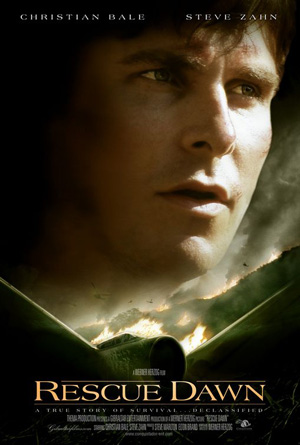 Rescue Dawn is slowly getting more notice. MGM is bringing the film to more screens, and as part of their promotion for the flick I got on the phone with Jeremy Davies a couple days ago.
Rescue Dawn is slowly getting more notice. MGM is bringing the film to more screens, and as part of their promotion for the flick I got on the phone with Jeremy Davies a couple days ago.
The film is controversial for more than one reason. For Werner Herzog fans it’s a departure from the style he’s developed over many years. The ending alone (it’s happy!) has drawn ire from followers.
But there have been deeper complaints. Jerry DeBruin, brother of Davies’ character Gene DeBruin, has issued a complaint tracking perceived factual accuracies in the film. (www.rescuedawnthetruth.com) I asked Davies about DeBruin’s issues and he claimed ignorance. I didn’t have enough time on the phone to sneak back around to the complaint.
But you can still see that Davies has wrestled in some sense with portraying a real person about whom there is very little information. In the end, the pure veracity (or lack thereof) of the film doesn’t undercut it’s power. No matter what place it holds in the historical record, Rescue Dawn should be seen.
What does the film’s broadening success suggest to you?
Well, I think it’s remarkable that it’s doing well despite the fact that I’m in it. I don’t know how big a fan of Herzog you are, but if so when you consider his history and the idea of Herzog ending up with a film that appeals to a wider audience…one of the things that’s compelling about this is it’s quite accidental. Werner ended up accidentally harnessed by a much more universally traditional story structure, a heroes journey if you will, being that the impetus for making this was to pay homage to his dear friend Dieter, and this is what he really went through.
But if this were fiction, or someone else’s account, Werner as you know has never been wildly attracted to linear storylines and traditional universal heroes, so it’s really interesting to see his very powerfully eccentric cine-magician touch and very laterally thinking cinematic mind working within the constructs of a traditional storyline.
Did the idea of this being a departure surface while he was working with you?
Yeah, a little bit. We discussed that. I think above all, the bottom line is what I realized right away…clearly one of my first questions after reading the script, which was really a sketch in a lot of ways, at least in terms of dialogue, there were obvious parallels that anyone could draw between what’s going on today and what was happening then. And I realized straightaway that he had no interest in making any kind of a political statement at all. And he subsequently turned out to be one of the most apolitical people I’ve ever met. So this film for Werner was the desire, as I said, to honor his friend.
And yet, while he is apolitical, he’s so in touch with currents that are flowing through culture. Is that in part due to you and others bringing that to the film?
I know for my part I only brought what he welcomed, of course. The key thing for me was to, above all, portray this individual [Gene] legitimately and authentically. To portray the prison camp experience authentically and to not look like a well fed pampered Hollywood actor who just walked out of his trailer. It meant a lot to me.
And I’d gained a lot of invaluable experience on another war film, Saving Private Ryan, that what was vividly important was to honor not only Gene, but men and women in uniform.
Beyond that, what we worked on bringing to the screen was to portray gene in a way that…any great story has beyond the obvious legitimate and authentic hero character, every strong story needs an equally complex and believable opposing force. We’ve all seen films where the opposing characters are two-dimensional and cartoonish. It weakens the film.
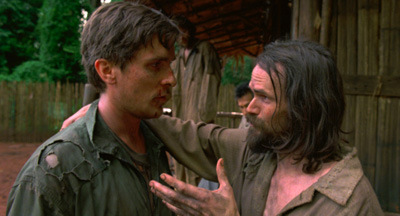
We not only wanted that to be strong in terms of bringing the strongest story, but portraying Gene’s opposing perspective on their situation in the camp was a really vital way of honoring Gene and all the individuals in the camp. By portraying his perspective as legitimately as possible and portraying his argument in a way that you may not agree with but can at least empathize with, I feel that Gene’s viewpoint was clearly not…no one would mistake it for a heroic perspective. It’s overly cautious and tipping towards fear rather than courage, but to understand that this gentleman, all of them, had been there for two years before Dieter showed up, and he basically crash landed on their belief system, or at least Gene’s, and what Gene was really holding on to, what was essential to his survival was that there was no war and that they would be released at any time.
I came to really empathize with Gene’s frustration with Dieter.
Have you read any of the criticisms of the film by Gene’s brother?
No, I haven’t.
Basically, they characterize Gene more as Dieter is in the film. He complains about inaccuracies, but paints Gene as a very caring guy and in some ways the architect of the escape; I don’t know how their take differs from Dieter’s in some ways, and how biased they may be.
No, I don’t know about that, but I really appreciate their input. That was one thing I fought for with Werner… on the page, his script was basically a sketch of situations. Everything Werner put in the script was hearsay from Dieter. And as Gene was never found, no one had the privilege of his perspective. And so what I was fighting for was to make sure that he didn’t come across as a dismissible, two-dimensional character. On the surface, he could have been interpreted that way in the original sketch. Werner did not want that and encouraged me to bring a lot more.
I think it’s very legitimate to say there’s a lot of humor in Gene that Werner allowed me to bring, and a lot of caring for Steve [Zahn’s] character. And just because they disagreed with Dieter giving them no choice but to leave the way they did, I think that honors Gene to say that.
In the end, of course, who really knows, except Dieter. He was relaying accounts of what Gene did or said in the camp, so it’s hard to know how anyone, Dieter included, behaved in the camp or during the escape. It’s a tough call.
Doing a story like this, with concerns of honoring real people, is there a point at which factual accuracy isn’t the most important thing to do the story justice? Where does stark historical record fit into a dramatic film?
Many people have asked about the pressures of dealing with the physical aspects — the location, low budget, tough shooting conditions. And I’ve long said that the most difficult thing for me, the biggest burden was that we were representing the memory of everyone who has been in the military, but here that I was representing an individual. The pressure came from not wanting to let them down. Not only did I not want to let this god-sized filmmaker down, but I didn’t want to let the individual down. That pressure is greatly accelerated when there’s no information available.
Werner didn’t have anything to offer me other than what Dieter had told him about Gene. Werner asked me to join his film tribe and take on this burden of portraying a real individual with no information about him. So I thought the most honorable thing I could do was make him as believable as possible. Not just to serve the story, but to present it in a way that he’s not just giving the mad ramblings of a guy who’s been in the camp too long. 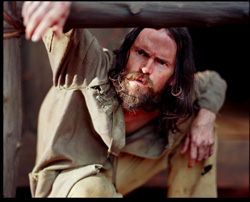 I’ll tell you one thing that really did help me, and I did do as much research as I possibly could on getting into the psyche of prisoners of war. One book that really made a tremendous amount of difference was Viktor Frankl’s Man’s Search For Meaning. He’s a survivor of Auschwitz, and he discusses a study on the difference between how certain individuals had a greater chance to survive a tragic experience, and why some had less.
I’ll tell you one thing that really did help me, and I did do as much research as I possibly could on getting into the psyche of prisoners of war. One book that really made a tremendous amount of difference was Viktor Frankl’s Man’s Search For Meaning. He’s a survivor of Auschwitz, and he discusses a study on the difference between how certain individuals had a greater chance to survive a tragic experience, and why some had less.
One of the things he talks about is the capacity to find a difference between stimulus and response, and to not react automatically, and to develop a belief system, or a helpful belief system. That’s a wildly abridged look at what he’s talking about, but what it distills down to, and how it helped me with Gene, was the idea that Gene had been there for two years and understanding that he’d been through torture and being a POW for years, and knowing that if he survived that long he had to be able to develop a reasonably strong belief system.
What we do know is that his system was that there was no war and their release was likely imminent. And if you can develop a belief system you can invest yourself into, it really goes a long way and makes all the difference in the world. Those who can’t do that develop a system that’s more tragic and negative, and have less chance of survival. For me, what made a lot of sense, was that someone like Dieter coming in would not be welcome if you have invested so much of yourself in the idea that there isn’t any war. If you feel like someone is pushing you and your friends to do something that was risking all your lives, as I believe in the end Dieter’s decision to go was not vividly democratic, shall we say, I related to Gene’s perspective in that sense.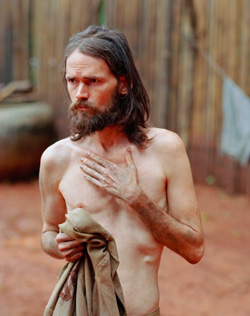 You said something about joining Werner’s film tribe. There’s a real mythology around him, his personality and working methods. I’m curious to hear your perspective on fact versus fiction.
You said something about joining Werner’s film tribe. There’s a real mythology around him, his personality and working methods. I’m curious to hear your perspective on fact versus fiction.
Sure…I’ll try to give you the abridged sense of it. The best way to answer is to digress a moment. The preamble to my getting to know and work with Werner is that I’ve done what any reasonable, confident agent in this town is terribly afraid their clients will do, which is I’ve kind of hijacked my misfit acting career and turned it into film school from day one, with the vaguely blasphemous idea of becoming a reasonably confident filmmaker in my own right one day. From Spanking The Monkey I made a deal with David O. Russell to be able to steal as much filmmaking wisdom as possible from the experience.
Long story short, that developed over the years into me, between films, actively seeking out filmmaking mentors in unorthodox ways. For example, I sent a letter to Lars von Trier, who I really wanted chance to work with up close. I sent him a letter — I had to fight with my agent to get him to send it because they wanted me to go through proper channels. They meant well. So I asked permission, not for a role at all, but to come study him and watch as he made whatever film he was doing next. Another long story short, against his better judgment he invited me out and made me take a role in Dogville. That started a richly rewarding apprenticeship, we became good friends, and he invited me back for the editing process, so I lived in Copenhagen for a while. So I’ve done that for a couple films with him.
This leads up to meeting Werner. He’s always been on the shortlist for me, as I said, as a god-sized filmmaker who I wanted to learn from as well. And the mythology you’re talking about, all those questions, of course I had myself. I had planned to send him a letter as well when he contacted me out of the blue. And the first thing I proposed to him was exactly what I wrote to Lars. I said, ‘I don’t know what you have planned for me and this role, but if it goes another way I’d still like to have permission to come out and work with you.’ And against his better judgment, he cast me.
So all that means that I brought all those questions to my experience with Werner. Like Lars, he took my desire for a film education very seriously and sort of took me under his wing and involved me in everything. I was in the editing room every single day, and I think he allowed me to contribute much more than he should have. In the end, I think Werner is a legitimately…he’s not an easy man to see through, and I think he likes it that way. And that translates powerfully to his films. A couple things about Werner that I find quite striking: first of all, I think he’s truly the most fearless person I’ve ever met.
Beyond that, something I find deeply influential is that he’s pathologically incapable of thinking any way but laterally about anything. So you can never predict what’s going to come out of his mouth or why or how he’s going to approach a scene. I think that translates in some really powerful ways to film. He’s drawn to things I’m drawn to. He welcomes the jazz interpretation of scenes and dialogue. He welcomes accidents. He doesn’t want, for example, Xerox machines for actors. He’s always in search of the unrepeatable moment on camera. Moments you can’t write in the script, that if you try to plan, you kill.
I would say that’s a very rambling way of addressing the mythology. I can see how it’s built up. But I believe that, if anything, it has much to do with the fact that he is genuinely eccentric in the very best sense of eccentric. It’s not some false spin or savvy self-promotion. He’s legitimately worthy of some mythologizing.
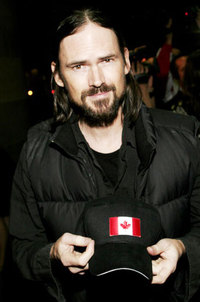 You’ve worked closely with David O. Russell, Lars von Trier and Herzog, perhaps the three most notorious directors around in terms of temperament. Is that temperament an essential quality for a director?
You’ve worked closely with David O. Russell, Lars von Trier and Herzog, perhaps the three most notorious directors around in terms of temperament. Is that temperament an essential quality for a director?
I can’t help but to be deeply influenced by these guys, and it’s definitely part of my personal alchemy as well that…well, I do feel that, as an actor, that unpredictability is useful. I have such accelerated respect for these men, because I understand the courage it takes for a filmmaker to welcome that kind of collaboration from their actors and all their collaborators. To not know exactly what someone is going to bring to the table. As you know, there are very competent filmmakers who prefer to work with those Xerox machine actors. They’re only listening for the notes of the melody that’s in their head, and if you don’t hit those notes you keep going until you do.
The way I see David and Lars and Werner, and virtually every filmmaker I’ve been wildly fortunate to work with, is they have a desire to really hear as many different ideas as possible and to be surprised by accidents. But it takes a lot of courage, particularly if you’ve written the script yourself, to rehearse to a point where you’re not narrowing it down to one interpretation, but to set up a springboard for spontaneity and allow this jazz interpretation. Or to find many different verbs within a scene to do from point A to point B.
When the camera is rolling and you’re really not sure where the actor across from you is going to be coming from then you’re not sure how you’re going to get what you need, or what verb you’re going to choose. That’s when it’s exciting for me, but for a filmmaker requires a lot of courage. And in subterranean film where the take ratio is maybe 3:1, you have to know how to get it ‘right’ within a couple takes and you have to move on. it takes courage to generate that unrepeatable moment. Necessary to your survival, you almost have to be self-conscious. Your impulse is to be cautious, to provide a take for insurance, something that will work, but maybe isn’t so free.
Before we go, I’m curious to know where things stand with Lars’s American trilogy.
He just made a film called The Boss Of It All; he wanted me to be in it, I was going to speak Danish in a small role, just to continue my studies. But SAG wouldn’t let me.
I don’t know what he’s planning to do next. He’s considering finishing up the trilogy with Washington, but I don’t think he’s made up his mind what he’s going to do next. One of the things with Lars, ironically, is that there are very few filmmakers in the world he feels are compelling or worth talking about. And to him, Werner is tremendously important. So the fact that I’ve ended up working with Werner is quite interesting. I’d like to try to get Werner to be in one of Lars’s films, actually. I think they really mutually respect each other.